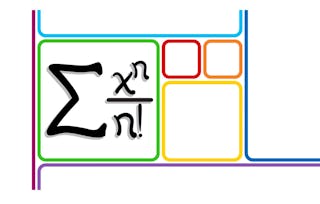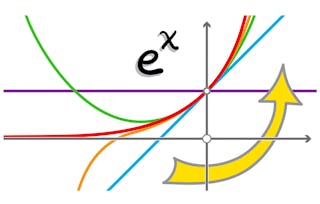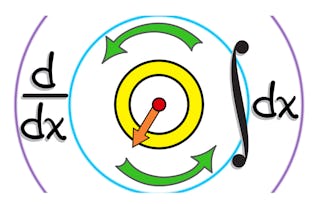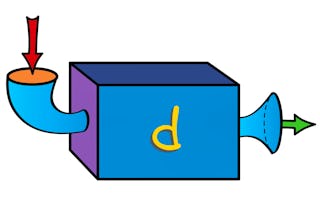Calculus is one of the grandest achievements of human thought, explaining everything from planetary orbits to the optimal size of a city to the periodicity of a heartbeat. This brisk course covers the core ideas of single-variable Calculus with emphases on conceptual understanding and applications. The course is ideal for students beginning in the engineering, physical, and social sciences. Distinguishing features of the course include: 1) the introduction and use of Taylor series and approximations from the beginning; 2) a novel synthesis of discrete and continuous forms of Calculus; 3) an emphasis on the conceptual over the computational; and 4) a clear, dynamic, unified approach.

Calculus: Single Variable Part 4 - Applications

283 avis
Compétences que vous acquerrez
- Catégorie : Integral Calculus
- Catégorie : Calculus
- Catégorie : Advanced Mathematics
- Catégorie : Physics
- Catégorie : Mathematical Modeling
- Catégorie : Probability & Statistics
- Catégorie : Mechanics
- Catégorie : Applied Mathematics
- Catégorie : Statistics
- Catégorie : Torque (Physics)
- Catégorie : Probability
- Catégorie : Geometry
Détails à connaître
32 devoirs
Découvrez comment les employés des entreprises prestigieuses maîtrisent des compétences recherchées

Il y a 5 modules dans ce cours
Having seen some calculus before, you may recall some of the motivations for integrals arising from area computations. We will review those classical applications, while introducing the core idea of this module -- a differential element. By computing area and volume elements, we will see how to tackle tough geometry problems in a principled manner.
Inclus
6 vidéos2 lectures9 devoirs
There's more to geometry than just area and volume! In this module, we will take things "to the next level", ascending to higher dimensions. Coming back to the 3-d world, we will return to problems of length and area, but this time in the context of curves and surfaces. As always, the emphasis will be on how to construct the appropriate differential element for integrating.
Inclus
4 vidéos6 devoirs
There is so much more to applications of integrals than geometry! So many subjects, from physics to finance, have, at heart, the need for setting up and computing definite integrals. In this short but intense module, we will cover applications including work, force, torque, mass, and present & future value.
Inclus
3 vidéos4 devoirs
There is a statistical aspect to integrals that has not yet been brought up in this course: integrals are ideal for computing averages. Motivated by physical problems of mass, centroid, and moments of inertia, we will cover applications of integrals to averages.
Inclus
5 vidéos6 devoirs
This capstone module gives a very brief introduction to probability, using what we know about integrals and differential elements. Beginning with common-sense uniform probabilities, we move on to define probability density functions and the corresponding probability element. Building on the physical intuition obtained from centers of mass and moments of inertia, we offer a unique perspective on expectation, variance, and standard deviation.
Inclus
3 vidéos1 lecture7 devoirs
Instructeur

Offert par
En savoir plus sur Math and Logic
 Statut : Prévisualisation
Statut : PrévisualisationUniversity of Pennsylvania
 Statut : Gratuit
Statut : GratuitUniversity of Pennsylvania
 Statut : Gratuit
Statut : GratuitUniversity of Pennsylvania
 Statut : Gratuit
Statut : GratuitUniversity of Pennsylvania
Pour quelles raisons les étudiants sur Coursera nous choisissent-ils pour leur carrière ?

Felipe M.

Jennifer J.

Larry W.

Chaitanya A.
Avis des étudiants
- 5 stars
90,45 %
- 4 stars
7,42 %
- 3 stars
1,06 %
- 2 stars
0,35 %
- 1 star
0,70 %
Affichage de 3 sur 283
Révisé le 9 déc. 2016
Really its hard to complete as many questions are tricky, but now i feel very nice after completion.
Révisé le 22 juin 2016
this was simply an amazing course, perfect for my skill level and exactly what i needed to learn. Thank you for the opportunity.
Révisé le 9 mars 2020
Simply awesome! I would love to learn the digital calculus and the multi-variate calculus online with professor Ghrist. Thank you! Dr. Ghrist

Ouvrez de nouvelles portes avec Coursera Plus
Accès illimité à 10,000+ cours de niveau international, projets pratiques et programmes de certification prêts à l'emploi - tous inclus dans votre abonnement.
Faites progresser votre carrière avec un diplôme en ligne
Obtenez un diplôme auprès d’universités de renommée mondiale - 100 % en ligne
Rejoignez plus de 3 400 entreprises mondiales qui ont choisi Coursera pour les affaires
Améliorez les compétences de vos employés pour exceller dans l’économie numérique
Foire Aux Questions
To access the course materials, assignments and to earn a Certificate, you will need to purchase the Certificate experience when you enroll in a course. You can try a Free Trial instead, or apply for Financial Aid. The course may offer 'Full Course, No Certificate' instead. This option lets you see all course materials, submit required assessments, and get a final grade. This also means that you will not be able to purchase a Certificate experience.
Plus de questions
Aide financière disponible,

